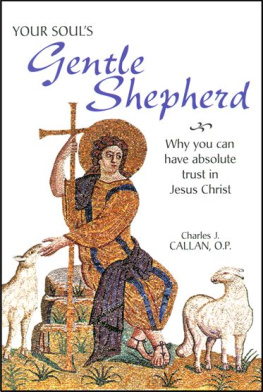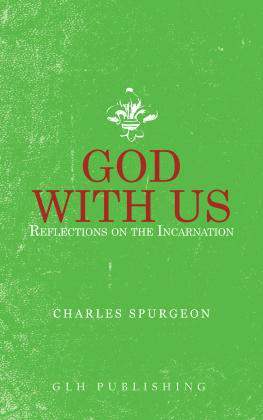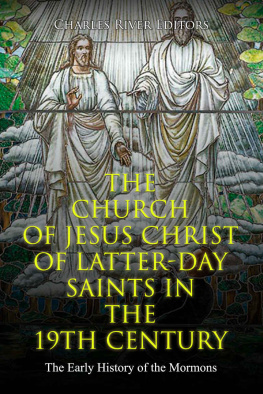


Your Souls Gentle Shepherd: Why You Can Have Absolute Trust in Jesus Christ was originally published by John Murphy Company, Baltimore, Maryland, in 1915 under the title The Shepherd of My Soul. This 1999 edition by Sophia Institute Press contains minor editorial revisions to and deletions from the original text.
Copyright 1999 Sophia Institute Press
All rights reserved
Printed in the United States of America
Jacket design by Lorraine Bilodeau
The cover artwork is the mosaic The Good Shepherd, in the Mausoleum of Galla Placidia, Ravenna, Italy (photo courtesy of Scala/Art Resource, New York).
No part of this book may be reproduced, stored in a retrieval system, or transmitted in any form, or by any means, electronic, mechanical, photocopying, or otherwise, without the prior written permission of the publisher, except by a reviewer, who may quote brief passages in a review.
Sophia Institute Press
Box 5284, Manchester, NH 03108
1-800-888-9344
www.sophiainstitute.com
Nihil obstat: M. A. Waldron, O.P.S.T.M., and J. A. McHugh, O.P.S.T.Lr.
Imprimi potest: J. R. Meagher, O.P.S.T.Lr.
Imprimatur: J. Cardinal Gibbons
Library of Congress Cataloging-in-Publication Data
Callan, Charles Jerome, 1877-1962.
[Shepherd of my soul]
Your souls gentle shepherd : why you can have absolute
trust in Jesus Christ / Charles J. Callan.
p. cm.
Originally published: Shepherd of my soul. Baltimore, Md. :
J. Murphy, 1915.
Includes bibliographical references.
ISBN 0-918477-93-X (pbk. : alk. paper)
1. Bible. O.T. Psalms XXIII Commentaries. 2. Bible. O.T.
Psalms XXIII Meditations. I. Title. |
BS1450 23rd.C3 1999 |
223.206 dc21 | 99-18651 CIP |

Contents

The Lord is my Shepherd; I shall not want.
He maketh me to lie down in pastures of tender grass.
He restoreth my soul.
He leadeth me in the paths of justice for His Names sake.
Yea, though I walk in the valley of the shadow of death,
I will fear no evil, for Thou art with me.
Thy rod and Thy staff, they comfort me.
Thou spreadest before me a table
in the presence of mine enemies.
Thou anointest my head with oil; my cup runneth over.
Surely goodness and mercy shall follow me
all the days of my life, and I shall dwell
in the house of the Lord unto length of days.

Editors Note: Some of the biblical references in the following pages are based on the Douay-Rheims edition of the Old and New Testaments, and others are based on the Revised Standard Version. The latter are designated by the following symbol: (RSV). Where applicable, quotations from the Douay-Rheims edition have been cross-referenced with the numeration in the Revised Standard Version, using the following symbol: (RSV =).

No images more beautiful could have been chosen under which to picture the character of our Lord and the souls He came to redeem than those of a shepherd and his flock. As nothing on earth could more fitly illustrate the infinite love and sacrifice of the Savior than the enduring labors and tenderness of a shepherd, so nothing here below could better portray the multiple wants of our spirits than the needful, dependent nature of sheep.
Beyond the knowledge we possess of our Redeemer, only a slight acquaintance with the characteristics of pastoral life, as it exists in oriental countries, is needed to discern the charming fitness of these comparisons. The similarity is at once striking and most easily understood. Hence it is that our Lord, as well as those who described Him before He came, so often appealed to shepherd life when speaking of the Messiahs mission; hence, also, it is that He was so fond of calling Himself the Good Shepherd, and of alluding to the souls He loved as His sheep.
It is the purpose of the pages that follow to trace some of these beautiful and touching resemblances between the shepherd with his flock, on the one hand, roaming over the hills and plains of Palestine, and, on the other hand, the Savior of the world with the souls of men, pursuing together the journey of life. We have taken as our guide, in noting these charming likenesses, the Twentysecond Psalm, or the psalm of the good shepherd, every verse of which recalls some feature or features of pastoral life, and sings of the offices, tender and varied, which the shepherd discharges toward his flock.
As this shepherd psalm was composed and written in the Hebrew tongue, the language of ancient Palestine, we have employed here a literal translation from the original language, simply because it expresses much more beautifully and more exactly than does any rendering from the Latin or Greek the various marks and characteristics of the shepherds life and duties. The oriental languages, like the people who speak them, are exceedingly figurative and poetic in their modes of expression; and hence, for our present purpose, it is only by getting back as closely as we can to the original that we are able adequately to appreciate the beauty and poetry of that simple but charming life about which the psalmist is singing.
Although the shepherd psalm refers, in its literal sense, to the human shepherd attending and providing for his sheep, it has also another higher meaning, which its author gave it, and this has reference to Christ in His relations with the souls He has made and redeemed. It is by reflecting on this sense of the psalm, and on all His gracious dealings with us, that we are enabled to realize how rightly and justly our Savior is called the Shepherd of our souls, and how beautifully the psalmist, in the shepherd psalm, has depicted His relations with us.
And how important this is! How much it means for our spiritual welfare and spiritual advancement to reflect on the many mercies of Christ and on the love He bears for each one of us! If the considerations that follow help you to appreciate more fully and love more ardently the divine Shepherd of souls, who daily and constantly throughout our lives is ministering to our spiritual needs and trying to further our eternal interests, the desire and aim which prompted their writing will be fully and perfectly realized.

Your Souls
Gentle Shepherd

Christ is
Next page
















